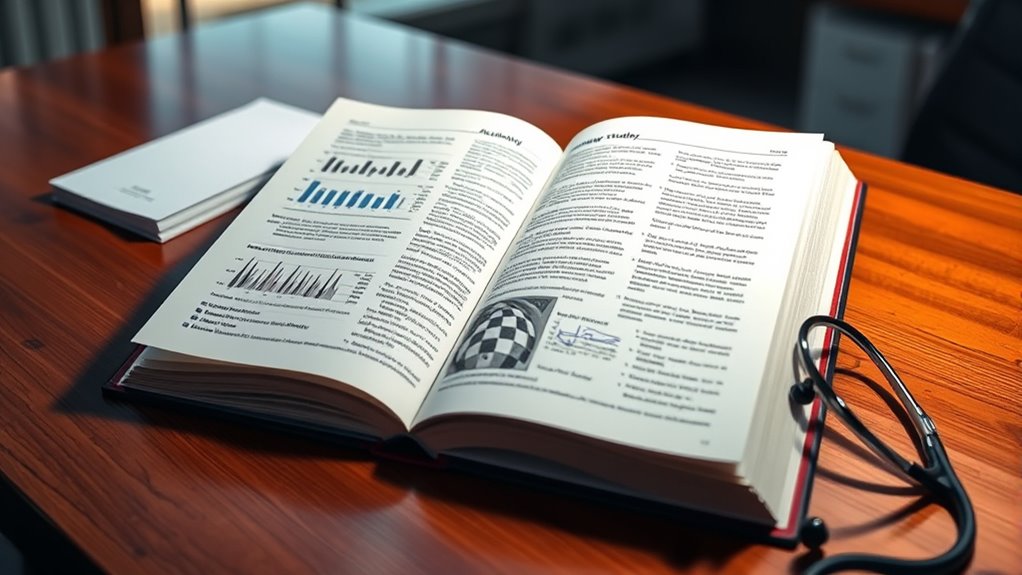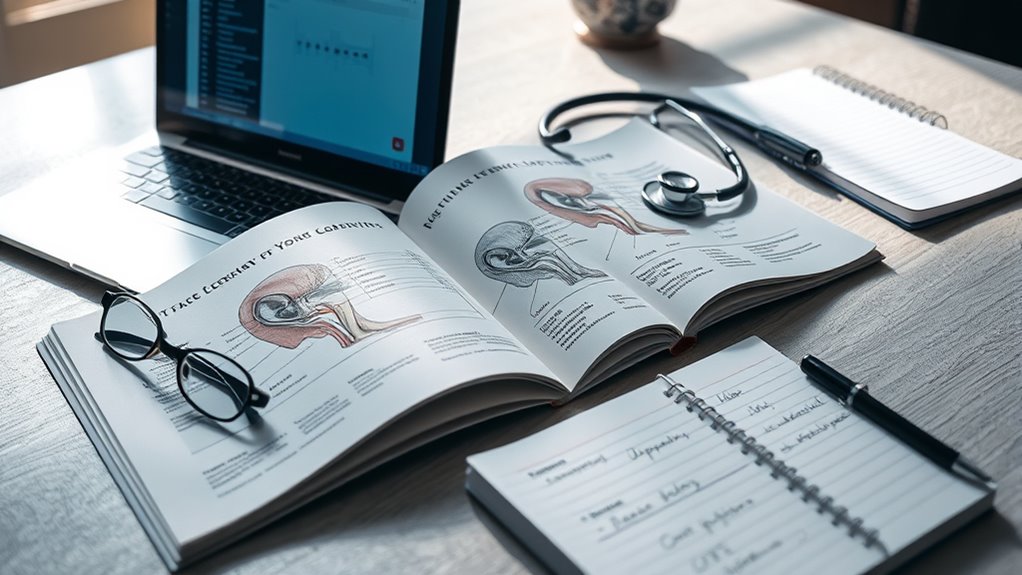Using medical literature to support your VA hearing claim strengthens your case by providing scientific evidence that links military noise exposure to tinnitus and hearing loss. You should include research studies, peer-reviewed articles, and medical records that confirm your diagnosis and show how your symptoms align with known effects of noise exposure. Citing reliable science makes your claim more credible and compelling. To learn how to effectively incorporate this evidence, keep exploring the key strategies involved.
Key Takeaways
- Incorporate peer-reviewed studies linking military noise exposure to tinnitus to establish scientific credibility.
- Use medical records and audiological evaluations to confirm diagnosis and correlate symptoms with service-related noise.
- Cite scientific research demonstrating how high-decibel environments during military service increase tinnitus risk.
- Combine medical documentation with authoritative literature to create a comprehensive, evidence-based claim.
- Highlight how scientific evidence supports the connection between service activities and tinnitus onset to strengthen your case.

Medical literature plays a crucial role in supporting VA hearing claims by providing scientific evidence that links service-related activities to hearing loss or tinnitus. When applying for benefits, having credible medical documentation is essential, especially when establishing a connection between your tinnitus diagnosis and noise exposure during your military service. Research shows that tinnitus often results from exposure to loud noises, which is common in various military environments. By referencing studies that confirm the relationship between noise exposure and tinnitus, you strengthen your claim’s validity and demonstrate that your condition is service-related.
Medical literature links military noise exposure to tinnitus, strengthening VA claims with credible scientific evidence.
A key part of your claim involves establishing a tinnitus diagnosis, ideally supported by medical professionals who have evaluated your condition thoroughly. Medical literature supports the idea that tinnitus can develop or worsen after significant noise exposure, such as gunfire, explosions, or heavy machinery. When you submit your claim, include medical records that document your tinnitus diagnosis, along with any audiological testing or evaluations that confirm the severity and impact of your condition. These records should highlight how your symptoms began during or after your service period, aligning with evidence from scientific studies linking noise exposure to tinnitus.
Research articles and peer-reviewed studies offer valuable insight into how noise exposure during military service can cause or aggravate tinnitus. For example, numerous studies demonstrate that individuals exposed to high-decibel environments are at increased risk of developing tinnitus. Citing such research helps establish a clear scientific basis for your claim. It’s also helpful to include expert opinions or medical literature reviews that discuss the correlation between noise exposure and tinnitus onset. This not only bolsters your case but also shows that your claim is grounded in recognized scientific understanding.
To maximize the effectiveness of your claim, bring together your medical records with relevant medical literature that emphasizes the connection between noise exposure and tinnitus diagnosis. This combination makes it easier for VA decision-makers to see that your condition is consistent with known effects of service-related noise exposure. Remember, the more specific and well-supported your evidence, the stronger your case becomes. By integrating authoritative scientific data into your claim, you increase your chances of receiving the benefits you deserve. Overall, leveraging medical literature is a strategic way to connect your tinnitus diagnosis to your military service, ensuring your claim is compelling, credible, and backed by current scientific knowledge. Recognizing the importance of scientific evidence can significantly strengthen your case and improve your chances of a successful claim.

BlaidsX Neuro Rechargeable RIC Programmable Hearing Aids for Seniors and Adults, Audiogram with Bluetooth Mobile App Hearing Test Audiogram & Noise Cancellation, Dual Mic & 32 DSP Channels | USA-Made
TAKE ADVANTAGE of our SALE to celebrate Blaids coming to Amazon! Blaids Hearing Aids were previously only available…
As an affiliate, we earn on qualifying purchases.
As an affiliate, we earn on qualifying purchases.
Frequently Asked Questions
How Do I Find Relevant Medical Literature for My Hearing Claim?
To find relevant medical literature for your hearing claim, start by searching peer-reviewed journals and medical databases like PubMed or Google Scholar. Use specific keywords related to your condition, such as “hearing loss” or “noise exposure.” Review recent studies to guarantee current information. Keep notes of important findings and consult your healthcare provider or a VA-accredited representative to help interpret the research for your claim.
Can I Use Outdated or Non-Peer-Reviewed Studies to Support My Case?
Using outdated or non-peer-reviewed studies is like building a house on shaky ground; it weakens your case. You can mention historical studies or non-peer-reviewed articles, but they shouldn’t be your main evidence. Focus on current, peer-reviewed research to strengthen your claim, as it provides solid, credible support. Relying on old or unverified information might undermine your case and reduce your chances of success.
What Specific Types of Medical Articles Strengthen VA Hearing Claims?
You should focus on peer-reviewed journals and clinical guidelines to strengthen your VA hearing claim. These sources provide credible, evidence-based information that supports your case. Look for recent studies on noise exposure, hearing loss, and treatment outcomes, as they carry more weight. Avoid outdated or non-peer-reviewed articles, as they lack the scientific rigor needed to substantiate your claim effectively.
How Do I Interpret Conflicting Medical Research Regarding Hearing Loss?
You should evaluate credibility by checking the sources of conflicting research, prioritizing peer-reviewed studies and reputable institutions. Balance evidence by comparing study methodologies, sample sizes, and conclusions to identify consistent findings. Investigate the truth of each theory by consulting multiple articles, noting where they agree or diverge. This approach helps you interpret conflicting research objectively, ensuring your claim is supported by the most reliable and exhaustive evidence available.
Is There a Preferred Format for Submitting Medical Literature to the VA?
You should submit medical literature in a clear, organized format, preferably using a recognized citation style like APA or MLA. Include copies of relevant medical journal articles, ensuring they’re properly cited with author, title, journal, volume, pages, and publication date. Attach these to your claim, and make sure your citations follow the VA’s preferred format, which helps reviewers easily verify the sources and strengthen your case.

VA Rating Criteria for a Hearing Loss & Tinnitus
As an affiliate, we earn on qualifying purchases.
As an affiliate, we earn on qualifying purchases.
Conclusion
Just like a sturdy bridge relies on solid supports, your VA hearing claim depends on credible medical evidence. When you gather strong medical literature, you’re building a reliable foundation that can carry your case. Imagine a veteran whose detailed audiology reports and expert opinions served as the pillars, helping them cross the finish line. With the right medical backing, you strengthen your claim and increase your chances of success—making your journey smoother and more secure.

ELEHEAR-Beyond OTC Hearing Aids, AI Powered Speech Enhancement and Tinnitus Masking, Superior Sound Quality, Connectivity with iOS or Android Devices via Bluetooth 5.3, for Seniors and Adults
Super Clear Sound – Powered by VocClear AI Technology with maximum gain of up to 50 dB and…
As an affiliate, we earn on qualifying purchases.
As an affiliate, we earn on qualifying purchases.

2 Pack 34dB Noise Canceling Headphones For Shooting, Hearing Protection Earmuffs, Ear Protection Headphones, Thickened Headband Ear Muffs For Noise Reduction For Shooting, Construction,Mowing
Efficient Hearing Protection: These noise canceling headphones are equipped with a double-layer sound-dampening foam and a composite housing…
As an affiliate, we earn on qualifying purchases.
As an affiliate, we earn on qualifying purchases.










